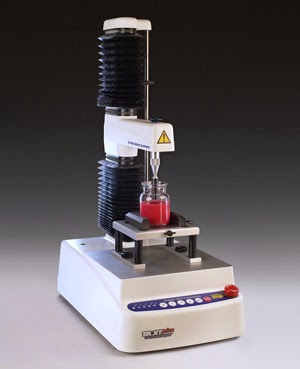Easy to eat food is increasingly required in the advanced-aged society in Japan. Mechanical properties of such foods must be modified such that the foods are easily broken by the tongue without chewing. When foods are compressed between the tongue and the hard palate, the tongue deforms considerably, and only soft foods are broken. To simulate tongue compression of soft foods, artificial tongues with stiffness similar to that of the human tongue were created using clear soft materials.
The scientists in this study used their TA.XTplus Texture Analyser to perform compression tests on cylindrical samples. The fracture properties measured using the soft machine were better than those obtained from a conventional test between hard plates to mimic natural oral processing in humans. The fracture force on foods measured using this soft machine may prove useful for the evaluation of food texture that can be mashed using the tongue. Read more
Scientists from the Department of Food Science, University of Tennessee, have been investigating the characterisation of oral tactile sensitivity and masticatory performance across adulthood. In a society that is rapidly aging, it is important to understand the subtle changes in physiology and eating behaviour that are associated with aging. This study used a variety of tests of oral sensitivity to better understand which aspects of oral physiology are integral for effective chewing.
Two main measures of oral sensitivity were performed: to assess bite force, subjects were asked to discriminate between foam samples of varying hardness. Second, to assess lingual sensitivity the subjects were asked to identify 3D printed shapes using their tongue, as well as identify confectionery letters. Additionally, masticatory performance was measured through assessing each participant’s ability to mix two‐coloured chewing gum. The researchers used their TA.XTplus Texture Analyser to verify sample hardness levels.
Sensitivity and masticatory performance in the younger age groups was superior to that of older adults but results suggested that age‐related declines in bite force sensitivity were not a significant cause of altered masticatory performance. This study represents a valuable first step in showing that bite force sensitivity does not depend on age, and the minimal influence of factors such as oral sensitivity on masticatory performance. Read more
By 2025, the world will have almost 800 million people over the age of 65.
 |
| Typical Compression Test |
While age is just a number, the numbers are certainly on the rise. Yet another challenge is that sensory perceptions necessary for the palatability of food – sight, touch, smell, and taste – diminish as humans age.
Taste is the most important factor for all consumers, but texture of food products may be a greater concern for older consumers than younger ones because of difficulty in chewing and swallowing.
How can texture analysis help? Request our article on Designing foods with specific health claims for an ageing population
We can design and manufacture probes or fixtures for the TA.XTplus texture analyser that are bespoke to your sample and its specific measurement.
Once your measurement is performed, our expertise in its graphical interpretation is unparalleled. Not only can we develop the most suitable and accurate method for the testing of your sample, but we can also prepare analysis procedures that obtain the desired parameters from your curve and drop them into a spreadsheet or report designed around your requirements.
For more information on how to measure texture, please visit the Texture Analysis Properties section on our website.
 The TA.XTplus texture analyser is part of a family of texture analysis instruments and equipment from Stable Micro Systems. An extensive portfolio of specialist attachments is available to measure and analyse the textural properties of a huge range of food products. Our technical experts can also custom design instrument fixtures according to individual specifications.
The TA.XTplus texture analyser is part of a family of texture analysis instruments and equipment from Stable Micro Systems. An extensive portfolio of specialist attachments is available to measure and analyse the textural properties of a huge range of food products. Our technical experts can also custom design instrument fixtures according to individual specifications.No-one understands texture analysis like we do!
To discuss your specific test requirements click here...
 |  |  |


No comments:
Post a Comment